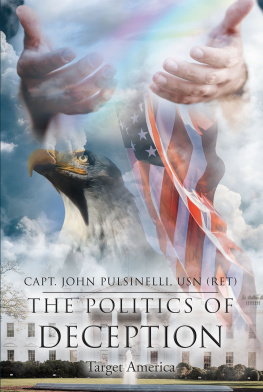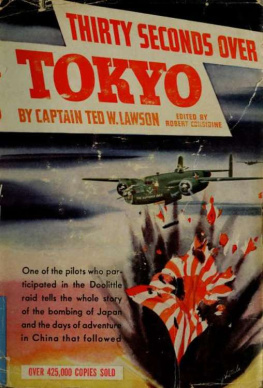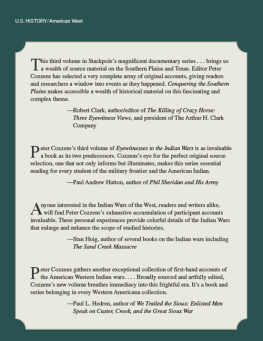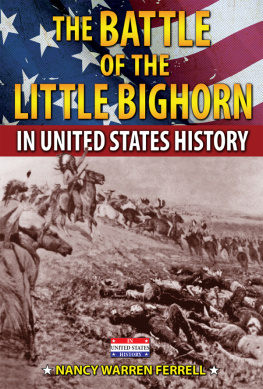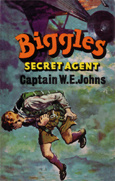
This edition is published by PICKLE PARTNERS PUBLISHINGwww.picklepartnerspublishing.com
To join our mailing list for new titles or for issues with our books picklepublishing@gmail.com
Or on Facebook
Text originally published in 1960 under the same title.
Pickle Partners Publishing 2015, all rights reserved. No part of this publication may be reproduced, stored in a retrieval system or transmitted by any means, electrical, mechanical or otherwise without the written permission of the copyright holder.
Publishers Note
Although in most cases we have retained the Authors original spelling and grammar to authentically reproduce the work of the Author and the original intent of such material, some additional notes and clarifications have been added for the modern readers benefit.
We have also made every effort to include all maps and illustrations of the original edition the limitations of formatting do not allow of including larger maps, we will upload as many of these maps as possible.
THE CUSTER FIGHT, CAPT. BENTEENS STORY OF THE BATTLE OF THE LITTLE BIG HORN
JUNE 25-26, 1876
By
E. A. BRININSTOOL
With Comments on the Rosebud Fight of June 17, 1876,
By ROBERT E. STRAHORN, War Correspondent for the CHICAGO TRIBUNE and NEW YORK TIMES
TABLE OF CONTENTS
Contents
TABLE OF CONTENTS 4
REQUEST FROM THE PUBLISHER 22
FOREWORD
FOR THE FIRST TIME since he testified before the Reno Court of Inquiry, at Chicago, in 1879, Capt. F. W. Benteen, senior captain of Custers regiment, the famous 7th Cavalry, here relates the part he played in that most disastrous of Indian fights on American soil, over which more controversy has raged than over any other battle fought against the red man in the United States.
Much of the account is from his own testimony at the Reno Inquiry; some of it is from the personal letters of Capt. Benteen, (in possession of the author). Certain charges were made against Major Marcus A. Reno and Capt. Benteen by Frederick Whittaker, Custers biographer. At the last moment Whittaker withdrew his charges against Capt. Benteen. He also utterly failed to substantiate his charges against Major Reno, the verdict of the Court being that there was nothing in his conduct which requires animadversion from the Court, and that in view of all the facts in evidence, no further proceedings are necessary in this case.
No officer in the Civil War won a more brilliant record than Major Reno, he being brevetted by grades from a first lieutenant to a colonel for gallant and meritorious service. Later, he served as Assistant Instructor of Infantry Tactics at the U. S. Military Academy at West Point.
The testimony at the Reno Inquiry revealed that both Capt. Benteen and Major Reno had done the best that could be done with what they had to do with, and that, but for their extraordinary heroism and bravery in the fight on the bluffs, following Custers overwhelming defeat, four miles down the river, the troops under their charge would likewise have been wiped out.
Capt. Benteens testimony and extracts from his letters proves absolutely that Custer had formed no battle plans at the time he made his battalion assignments; or, if he had such plans, he did not reveal them to either Major Reno or Capt. Benteen.
While the numbers of the attacking Indians has been variously estimated at from 1,500 to 4,500, Capt. Benteen states that, in his opinion, they numbered 8,000 or 9,000.
Students of the battle of the Little Big Horn will do well to carefully preserve this account of the Custer fight as related by Capt. Benteen.
E. A. BRININSTOOL.
Los Angeles, California,
July 15, 1933.
CAPTAIN BENTEENS OWN STORY
ON THE MORNING of the 24th of June, General Custer rode by my bivouac of the night before. I approached him and reported that, on account of fearing for the safety of the pack-train the day before, I had placed the battalion on guard differently from the manner he had ordered.
Custer stammered slightly and said, I am much obliged to you, Colonel Benteen; I will direct the officer who relieves you to guard the train in the manner you have done. As my duties ended on delivering the pack-train at camp on the 23d, I did not have to report to the commanding officer with the new officer of the day.
The march of June 24th was interrupted by frequent and sometimes quite lengthy halts of the column, but on what accounts I was not aware; but on arriving at Mud Creek, which was to be our place of bivouac, I was loudly called to by Colonel Keogh to come where he was; that he had been saving for me a snug nook, with beautiful grass in it for me, that I might camp next to him. The reply to this was characteristic of the plainssomething like Bully for you, Keogh; Im your man!
After our frugal repasts which went for dinner, Colonel Keogh and his lieutenant, Porter, came over to my bivouac, where, sitting around were four or five officers engaged in listening to Lieut. De Rudios yarns. However, I placed my saddle in position for a pillow, and notified the gentlemen that I was going in for what sleep I could pick up, as I was impressed with the belief that we would not remain in that camp all night.
The officers, however, went on with their conversation, and before I had caught a wink of sleep, an orderly from regimental headquarters came with information to us to meet at once at headquarters. It was then pitch dark; so I called up my first sergeant and directed him to see that everything was in order for an immediate move, as I didnt think we would be allowed to remain in that camp all night. The sergeant assured me that everything was in good shape, so I then started to find Custers headquarters.
I had not gotten far on the way thereto when I stumbled across Lieut. Edgerly, who informed me that it was not necessary to go any farther, as the only orders were that we were to move at 11 oclock that night, at which hour we did move.
However, there was an hour and a half consumed in getting the pack-train across Mud Creek. Colonel Keogh had charge of the packs on that move, and the column remained impatiently on the other bank of the creek while Keogh was superintending the crossing of the pack-train.
Some little time after the column got started on the march, the only guide of direction I had for my troop was the pounding of tin cups on the saddles of the men in rear of the troop preceding me in the column.
About this time, Colonel Keogh rode up to me complaining that he couldnt tell head or tail of the pack-train; didnt know where the Sheol they were and what was he going to do about it? I told him to take it easier; that nothing but an Indian could run one of those mules off. Some of the packs, of course, might slip off and be left behind, but we could recover the same at daylightand the tin-cup pounding on saddles of the troop ahead of me went on all of which suddenly ceasedthe column was at a halt, pack-train and all spread out together.
I should think an hour and a half after this, daylight began to peer through, and I noticed General Custer pass me on horseback. He went on, saying nothing to me. Just then I noticed Major Reno on the other side of a ravine, about to sit down to breakfast; so, not knowing where I would get any breakfast, I went over and assisted them in disposing of what they had.


